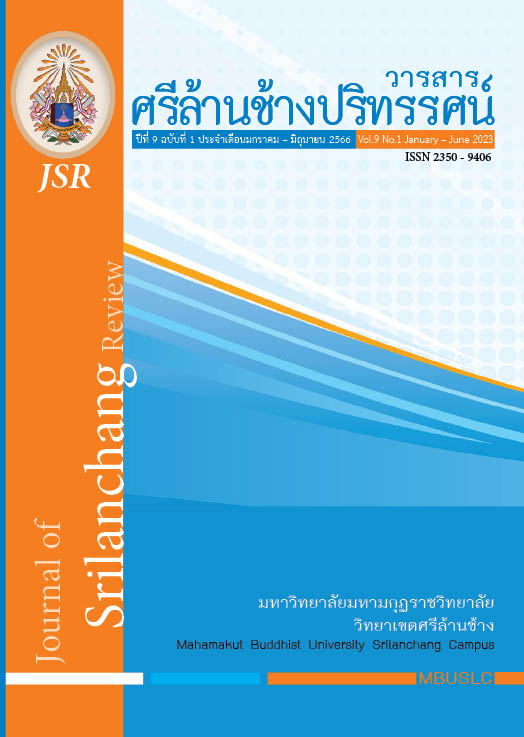APPLICATION OF SEVEN SAPPURISADHAMMA PRINCIPLES TO PERSONNEL MANAGEMENT OF SCHOOL ADMINISTRATORS UNDER NAKHON SI THAMMARAT PRIMARY EDUCATIONAL SERVICE AREA OFFICE 3
Main Article Content
Abstract
The objectives of the article were to study the application of the Buddhist principle of Sappurisa-dhamma (Seven virtues of a good person) to the personnel management of school administrators under the Nakhon Si Thammarat Primary Educational Service Area Office 3, to compare the application of Sappurisa-dhamma to the personnel management of school administrators under the Nakhon Si Thammarat Primary Educational Service Area Office 3, classified by the respondents’ gender, educational level, and work experience, and 3 to study the guideline on application of Sappurisa-dhamma to the personnel management of school administrators under the Nakhon Si Thammarat Primary Educational Service Area Office 3. The research population was a total of 1,602 teachers from 223 schools under the Nakhon Si Thammarat Primary Educational Service Area Office 3 in the academic year of 2021; the sample group of 310 teachers were selected through Krejcie and Morgan’s sample size calculation table. The research tool used for data collection was the five-level rating scale questionnaire with the reliability of 0.95. The statistics used for data analysis consisted of frequency distribution, percentage, arithmetic mean, standard deviation, the t-test for independent samples, and the F-test (one way ANOVA).
The research results were as follows:
- The application of Sappurisa-dhamma to the personnel management of school administrators under the Nakhon Si Thammarat Primary Educational Service Area Office 3 was found to be overall at a high level. Separately considered in the descending order, Parisanyuta (Parisaññutā: knowing the assembly or society) was at the highest level, followed by Kalanyuta (Kālaññutā: knowing the proper time), Attanyuta (Attaññutā: knowing oneself), and Mattanyuta (Mattaññutā: knowing the moderation), respectively.
- 2. The comparison of the application of Sappurisa-dhamma to the personnel management of school administrators under the Nakhon Si Thammarat Primary Educational Service Area Office 3, classified by the respondents’ gender, was overall and separately not different. Classified by the respondents’ educational level, it was overall not different. Classified by work experience, it was overall not different. The comparison of application of Sappurisa-dhamma’s Atthanyuta (Atthaññutā: knowing the consequence) was different at a statistically significant level of 0.05.
3. The study of the guidelines for application of Sappurisa-dhamma to the personnel management of school administrators under the Nakhon Si Thammarat Primary Educational Service Area Office 3 revealed that the school administrators supported the teachers to comply with the regulations, specified certain regulations for the teachers, and praised them with successful performance in order to promote their progress.
Article Details

This work is licensed under a Creative Commons Attribution-NonCommercial-NoDerivatives 4.0 International License.
บทความที่ได้รับการพิจารณาจากคณะกรรมการผู้ทรงคุณวุฒิและเผยแผ่ในวารสารฉบับนี้ เป็นทัศนคติและข้อคิดเห็นส่วนบุคคลของผู้เขียนแต่ละท่าน ไม่ถือว่าเป็นทัศนะคติและความรับผิดชอบ
ของบรรณาธิการ
บทความ ข้อมูล เนื้อหา รูปภาพ ฯลฯ ที่ได้รับการตีพิมพ์ในวารสารศรีล้านช้างปริทรรศน์ ถือเป็นลิขสิทธิ์ของวารสารศรีล้านช้างปริทรรศน์ หากบุคคลหรือหน่วยงานใดต้องการนำทั้งหมดหรือส่วนหนึ่งส่วนใดไปเผยแพร่ต่อหรือเพื่อกระทำการใด ๆ จะต้องได้รับอนุญาตเป็นลายลักอักษรจากวารสารศรีล้านช้างปริทรรศน์ ก่อนเท่านั้น
References
จักรวาล สุขไมตรี. (2560). ความรู้เบื้องต้นการบริหารรัฐกิจ. บัณฑิตวิทยาลัย มหาวิทยาลัยมหามกุฏราชวิทยาลัย. กรุงเทพฯ: j. Prin.
ชลธิชา ดังสะท้าน. (2559). การบริหารงานตามหลักสัปปุริสธรรม 7 ของผู้บริหารสถานศึกษาสังกัดเทศบาล นครศรีธรรมราช. สารนิพนธ์ ศษ.ม. (การบริหารการศึกษา). นครปฐม: บัณฑิตวิทยาลัย มหาวิทยาลัยมหามกุฏราชวิทยาลัย
ธงชัย เจริญนนท์. (2550) การนำหลักสัปปุริสธรรมไปใช้ในการพัฒนาชุมชน: กรณีศึกษาองค์การบริหารส่วนในเขตจังหวัดร้อยเอ็ด. รายงานการวิจัย. นครปฐม: บัณฑิตวิทยาลัย มหาวิทยาลัยมหามกุฏราชวิทยาลัย
พระครูปลัดศุภชัย ปริชาโน (ฉัตรคู่). (2563). นวัตกรรมที่ส่งเสริมการจัดการเรียนรู้ด้านสภาพแวดล้อม สำหรับนักเรียนโรงเรียนประถมศึกษา สังกัดกรุงเทพมหานคร. วารสารครุศาสตร์ปริทรรศน์ฯ. 7(3). กันยายน-ธันวาคม 2563.
พระครูสันติธรรมมารัต (บุญชัย สนฺติกโร). (2557). การพัฒนารูปแบบการปกครองคณะสงฆ์ในเขตปกครองคณะสงฆ์ ภาค 15. วิทยานิพนธ์ พธ.ด. (การจัดการเชิงพุทธ). อยุธยา: บัณฑิตวิทยาลัย มหาวิทยาลัยมหาจุฬาลงกรณราชวิทยาลัย
พระปภังกร อภิชวโน. (2559). การบริหารกิจการคณะสงฆ์ตามหลักพรหมวิหารธรรมของพระสังฆาธิการ ในเขตอำเภอบ้านโป่ง จังหวัดราชบุรี. วิทยานิพนธ์ ร.ม. (รัฐศาสตร์การปกครอง). นครปฐม: บัณฑิตวิทยาลัย มหาวิทยาลัยมหามกุฏราชวิทยาลัย
พระมหากฤษดา เขมจิตฺโต. (2559). บทบาทการปกครองคณะสงฆ์ของพระสังฆาธิการตามทัศนคติของพระสงฆ์ เขตหนองแขม กรุงเทพมหานคร. วิทยานิพนธ์ ร.ม. (รัฐศาสตร์การปกครอง). นครปฐม: บัณฑิตวิทยาลัย มหาวิทยาลัยมหามกุฏราชวิทยาลัย
พระมหาญาณวัฒน์ ฐิตวฑฺฒโน. (2559). ระบบการส่งเสริมดูแลช่วยเหลือนักเรียนสำหรับสถานศึกษาตามหลักพุทธธรรมสังกัดสำนักงานเขตพื้นที่การศึกษาประถมศึกษา. วิทยานิพนธ์ พธ.ม. (พุทธบริหารการศึกษา). อยุธยา: บัณฑิตวิทยาลัย มหาวิทยาลัยมหาจุฬาลงกรณราชวิทยาลัย
พระศตวรรษ กิตฺติปาโล. (2562). การประยุกต์ใช้หลักสัปปุริสธรรมในการส่งเสริมการปกครองของพระสังฆาธิการในเขตจังหวัดนนทบุรี. วิทยานิพนธ์ ร.ม. (การปกครอง). นครปฐม: บัณฑิตวิทยาลัย มหาวิทยาลัยมหามกุฏราชวิทยาลัย
พระสมเกียรติ ปญฺาวุโธ. (2557). สภาพการปกครองคณะสงฆ์ในเขตปกครองคณะสงฆ์อำเภอทุ่งใหญ่ นครศรีธรรมราช. วิทยานิพนธ์ ร.ม. (รัฐศาสตร์การปกครอง). นครปฐม: บัณฑิตวิทยาลัย มหาวิทยาลัยมหามกุฏราชวิทยาลัย
พระสุรนาท ญฺาณสมฺปฺนโน. (2559). การประยุกต์ใช้หลักสัปปุริสธรรมในการบริหารงานขององค์การบริหารส่วนตำบลในเขตอำเภอบ้านม่วง จังหวัดสกลนคร. วิทยานิพนธ์ ร.ม. (รัฐศาสตร์การปกครอง). นครปฐม: บัณฑิตวิทยาลัย มหาวิทยาลัยมหามกุฏราชวิทยาลัย
พระสุวรรณภูมิ ธมฺมรโต (อินทร์รัมย์). (2561). ระบบการบริหารงานบุคคลตามหลักพุทธบริหารการศึกษาของผู้บริหารสถานศึกษา สังกัดสำนักงานเขตพื้นที่การศึกษามัธยมศึกษา. วิทยานิพนธ์ พธ.ด. (พุทธบริหารการศึกษา). อยุธยา: บัณฑิตวิทยาลัย มหาวิทยาลัยมหาจุฬาลงกรณราชวิทยาลัย
มหาจุฬาลงกรณราชวิทยาลัย. (2560). พระไตรปิฎกภาษาไทย ฉบับมหาจุฬาลงกรณราชวิทยาลัย.กรุงเทพมหานคร: โรงพิมพ์มหาจุฬาลงกรณราชวิทยาลัย.
สำนักงานคณะกรรมการการศึกษาแห่งชาติ. (2542). พระราชบัญญัติการศึกษาแห่งชาติ พุทธศักราช 2542. กรุงเทพฯ : พริกหวานกราฟฟิค
เสน่ห์ บุญกำเนิด. (2564). การประยุกต์ใช้หลักสัปปุริสธรรมในการบริหารงานของคณะผู้บริหารองค์การบริหารส่วนตำบลปากน้ำ อำเภอเมืองชุมพร จังหวัดชุมพร. วารสารมหาจุฬานาครทรรศน์. 8(12). ธันวาคม 2564


